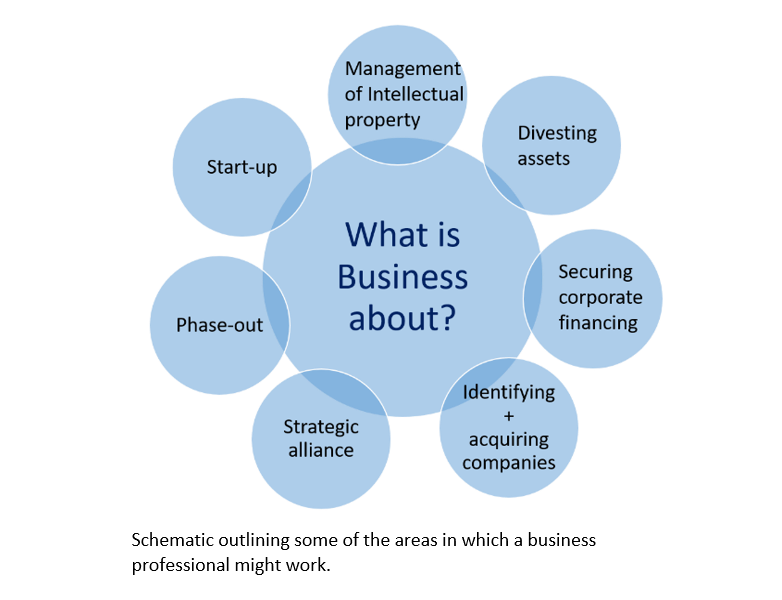By: Brianna Alexander
In recent years, STEM PhDs have begun to explore an array of non-academic career fields, including science communication, research & development, and patent law/government. Perhaps this career venturing has popularized as a result of graduate students learning the translational potential of their training. Excitingly, as the workplace expands and more value is given to new insights and perspectives, there are a growing number of positions being filled by and created for STEM PhDs in a host of non-traditional STEM fields, including Business.
Business, according to Investopedia, refers largely to the “organized efforts and activities of individuals to produce and sell goods and services for profit.” To explore this topic more and invite students to step into the shoes of a business professional, iJobs hosted a virtual Business simulation and workshop on October 26th. The iJobs workshop featured well-seasoned business professional, Evelyn Chang, who lead an informative discussion and engaging case study.
Ms. Chang is currently the Associate Director of Compliance at Minaris Regenerative Medicine LLC. There, she is responsible for various tasks including internal auditing, ensuring data integrity, as well as management review. She received her bachelor’s degree in Computer Engineering and master’s in Pharmaceutical Engineering from the New Jersey Institute of Technology. Furthermore, Ms. Chang earned her Executive MBA in Finance, Strategy, and Leadership from the Rutgers school of Business. Ms. Chang shared that in her 16+ years as a business professional that she has worked in several areas including contract development, biotechnology, medical device management, and cell and gene therapy. She has even co-founded a software solution service called JaBed Tech. After a brief introduction and gauging the business-knowledge of the attendees, she led a keen and well-tailored workshop diving into the principles of business and business development, including a case study to engage participants in practical application.
What is Business about? To help participants envision life as a business professional, Ms. Chang began the event by discussing some tasks/activities in which a business professional might engage.

- Start-up: recruiting/expanding team to increase in potential revenue
- Phase-out: Shifting from less-revenue-generating product to more-revenue-generating product. This is necessary when a previous business is no longer fruitful.
- Strategic alliance: Establishing potentially profitable collaboration between businesses
- Identifying + acquiring companies: expanding a business to include smaller, manageable companies to increase potential output and revenue
- Securing corporate financing: strategizing funding sources to maximize product value and profit
- Divesting assets: Selling an asset to increase profit potential
- Management of Intellectual property: i.e patents, copyrights
What are the stages of Business Development? After familiarizing attendees with some areas of business, Ms. Chang discussed a strategy of business development. She emphasized that business development can be distilled down to three main points: Vison, Strategy of Execution, and Commercialization. 1)Vision- what an individual brings to a business which, ideally, should align with the company vision and be “top tier”. 2) Strategy of Execution- this is an evaluation of the plan and the steps needed to execute the plan successfully. At this stage, practical decisions are made regarding the feasibility of the project (i.e- are there enough starting materials, equipment/resources at the site, etc.). 3) Commercialization- this, Ms. Chang stated, is when the project has been approved and is ready to be moved into the active state of large-scale production. Keeping these phases in mind can help to maintain organization and a realistic sense of progress and productivity within the business environment.
Finally, the capstone of the workshop was a case study simulation where attendees participated in evaluating the potential of a drug in a competitive market. Attendees were divided into three groups and given a template of information for their drug, including drug inventory, as well as links to federal resources to learn more about the approved use of the drug. After investigating current market competitors and potential uses of the drug, groups decided if the drug was a “go” or “no-go” to market. This simulation resulted in a very enlightening conversation where several unique arguments were presented in the decision-making process. For example, one point discussed was the feasibility of marketing a drug for an alternative implication/to a new target group if the competitive window is wide. Participants were encouraged to be creative in the thinking process, and to fully utilize publicly available resources and datasets. In addition, one very valuable aspect of the simulation was that it allowed attendees to see how skills honed every day in the lab, including critical thinking and project management, can be useful in the capacity of a business professional.
This was an extremely useful and informative workshop/simulation where attendees learned about some of the activities of a business professional, reviewed a strategy for business development, and engaged in a practical case study. Ms. Chang was very enthusiastic, eager to share her experiences, and happy to answer student questions. This event, like many others this semester, demonstrated how our PhDs can be stretched beyond the traditional STEM career paths and into more non-conventional fields such as Business!
This Article was edited by Junior Editor Rukia Henry and Senior Editor Samantha Avina.